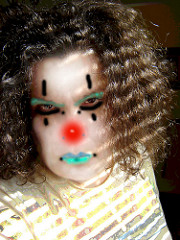AP Psychology (Abnormal Psychology) – Flashcards
Unlock all answers in this set
Unlock answersquestion
Narcissistic personality disorder

answer
a personality disorder characterized by exaggerated ideas of self-importance and achievements; preoccupation with fantasies of success; arrogance
question
Dissociative Disorders

answer
disorders in which conscious awareness becomes separated (dissociated) from previous memories, thoughts, and feelings
question
Anxiety
answer
a vague unpleasant emotion that is experienced in anticipation of some (usually ill-defined) misfortune
question
Abnormal Psychology
answer
The field of psychology concerned with the assessment, treatment, and prevention of maladaptive behavior.
question
interns syndrome
answer
a tendency to diagnose one's self while studying any particular disorder
question
DSM-IV-TR
answer
Abbrevation for the Diagnostic and Statistical Manual of Mental Disorders, Fourth Edition, Text Revision; the book published by the American Psychiatric Association that describes the specific symptoms and diagnostic guidelines for different psychological disorders
question
Neurotic disorders
answer
mental disorders in which a person does not have signs of brain abnormalities and does not display grossly irrational thinking or violate basic norms but does eperience subjective distress; a category dropped from DSM-III
question
neologisms
answer
Made-up words that typically have only meaning to the individual who uses them. Typical of disorganized schizophrenic person
question
Psychotic Disorders
answer
psychological disorders of thought and perception, characterized by inability to distinguish between real and imagined perceptions.
question
eclectic
answer
selecting what seems best of various styles or ideas
question
David Rosenhan
answer
A social psychologist that did a study in which healthy patients were admitted to psychiatric hospitals and diagnoses with schizophrenia; showed that once you are diagnosed with a disorder, the label, even when behavior indicates otherwise, is hard to overcome in a mental health setting
question
Rosenhan Study
answer
study in which healthy individuals were admitted into mental hospitals after saying they were hearing voices. Once in, they acted normally and still were not labeled as impostors.
question
phobia
answer
an anxiety disorder characterized by extreme and irrational fear of simple things or social situations
question
generalized anxiety disorder
answer
an anxiety disorder characterized by chronic free-floating anxiety and such symptoms as tension or sweating or trembling of light-headedness or irritability etc that has lasted for more than six months
question
panic disorder
answer
an anxiety disorder marked by unpredictable minutes-long episodes of intense dread in which a person experiences terror and accompanying chest pain, choking, or other frightening sensations
question
obsessive-compulsive disorder
answer
An anxiety disorder characterized by unwanted repetitive thoughts (obsession) and/ or actions (compulsions).
question
posttraumatic stress disorder
answer
an anxiety disorder associated with serious traumatic events and characterized by such symptoms as survivor guilt, reliving the trauma in dreams, numbness and lack of involvement with reality, or recurrent thoughts and images
question
agoraphobia
answer
a morbid fear of open spaces (as fear of being caught alone in some public place)
question
compulsions
answer
repetitive behaviors or mental acts performed to reduce or prevent stress
question
obsessions

answer
repeated, intrusive, and uncontrollable irrational thoughts or mental images that cause extreme anxiety and distress
question
Somatoform Disorders
answer
class of psychological disorders involving physical ailments or complaints that cannot be explained by organic causes
question
hypochondriasis
answer
A somatoform disorder characterized by excessive preoccupation with health concerns and incessant worry about developing physical illnesses.
question
conversion disorders
answer
Somatoform disorders in which a dramatic specific disability has no physical cause but instead seems related to psychological problems
question
psychogenic amnesia
answer
this is when a person cannot remember things and no physiological basis for the disruption in memory can be identified
question
fugue
answer
dissociative disorder in which a person forgets who who they are and leaves home to creates a new life
question
dissociative identity disorder
answer
a rare dissociative disorder in which a person exhibits two or more distinct and alternating personalities. Also called multiple personality disorder.(DID)
question
Retrograde amnesia
answer
loss of memory for events that occurred before the onset of amnesia; eg a soldier's forgetting events immediately before a shell burst nearby, injuring him
question
Anterograde amnesia
answer
loss of memory for events that occur after the onset of the amnesia; eg, see in a boxer who suffers a severe blow to the head and loses memory for events after the blow
question
Major depression
answer
disorder causing periodic disturbances in mood that affect concentration, sleep, activity, appetite, and social behavior; characterized by feelings of worthlessness, fatigue, and loss of interest
question
dysthymic disorder
answer
a mood disorder involving a pattern of comparatively mild depression that lasts for at least two years
question
seasonal affective disorder
answer
Controversial disorder in which a person experiences depression during winter months and improved mood during spring. Can be treated using phototherapy, using bright light and high levels of negative ions.
question
Affective Disorders
answer
Conditions is which feelings of sadness or elation are excessive, and not realistic, given the person's life conditions.
question
mania
answer
An intense or extreme enthusiasm or excitement.
question
Personality Disorders
answer
psychological disorders characterized by inflexible and enduring behavior patterns that impair social functioning
question
Antisocial personality
answer
personality who lacks a conscience, is emotionally shallow, impulsive, and selfish, and tends to manipulate others
question
Histrionic personality disorder
answer
a personality disorder characterized by excessive emotionality and preoccupation with being the center of attention; emotional shallowness; overly dramatic behavior
question
Dependent personality disorder
answer
personality disorder in which the person is unable to make choices and decisions independently and cannot tolerate being alone
question
Paranoid personality disorder
answer
A personality disorder characterized by a pervasive distrust and suspiciousness of the motives of others without sufficient basis
question
Obsessive-compulsive personality disorder
answer
personality disorder defined by a pervasive pattern of orderliness, perfectionism, and mental and interpersonal control. workaholics, intolerant of emotional behavior of other people.
question
Schizophrenia
answer
group of disorders characterized by disorganized and delusional thinking, disturbed perceptions, and inappropriate emotions and actions
question
Positive Symptom
answer
A symptom of schizophrenia, including thought disorder, delusions, and hallucinations
question
Delusions
answer
false beliefs, often of persecution or grandeur, that may accompany psychotic disorders
question
delusions of grandeur
answer
A false belief that one is a famous person or a powerful or important person who has some great knowledge, ability, or authority. Schizophrenia.
question
delusions of prosecution
answer
belief that somebody is out to get you
question
Hallucinations
answer
false sensory experiences, such as seeing something in the absence of an external visual stimulus
question
Inappropriate effect
answer
Display of emotions that are unsuited to the situation; a symptom of schizophrenia.
question
Negative Symptom
answer
symptom that reflects insufficient functioning, functions that have been lost (ex: social withdrawal, slowness of thought/speech)
question
Flat effect
answer
Abnormality of mood and affect., lack of emotional response; no expression of feeling; voice monotonous and face immobile
question
Catatonia
answer
a form of schizophrenia characterized by a tendency to remain in a fixed stuporous state for long periods
question
waxy flexibility
answer
feature of catatonic schizophrenia in which people rigidly maintain the body position or posture in which they are placed by others
question
Paranoid Schizophrenia
answer
type of schizophrenia characterized by hallucinations and delusions of persecution or grandeur (or both), and sometimes irrational jealousy.
question
Disorganized Schizophrenia
answer
type of schizophrenia characterized by severely disturbed thought processes, frequent incoherence, disorganized behavior, and inappropriate affect. Usually found in Homeless people.
question
clang associations
answer
psychotic speech in which words are rhymed and spoken for their appealing sound, found mainly in a disorganized schizophrenic person
question
Catatonic Schizophrenia:
answer
a condition marked by striking motor disturbances, ranging from muscular rigidity(stupor) to random motor activity, also parrot behavior
question
Undifferentiated Schizophrenia
answer
diagnosis made when a person experiences schizophrenic symptoms, such as delusions and hallucinations, but does not meet criteria for paranoid, disorganized, or catatonic schizophrenia
question
Paraphilias
answer
Sexual disorders in which sexual arousal occurs almost exclusively in the context of inappropriate objects or individuals.
question
zoophilia
answer
Using sexual contact with animals as the primary means of achieving sexual gratification
question
fetishism
answer
a paraphilia in which a nonhuman object is the preferred or exclusive method of achieving sexual excitement
question
voyeur
answer
Peeping Tom; person who derives sexual gratification from observing the sexual acts of others
question
masochist
answer
one who enjoys his or her own pain and suffering
question
sadist
answer
someone who obtains pleasure from inflicting pain or others
question
Anorexia Nervosa
answer
an eating disorder in which a normal-weight person (usually an adolescent female) diets and becomes significantly (15 percent or more) underweight, yet, still feeling fat, continues to starve.
question
Bulimia Nervosa
answer
an eating disorder characterized by episodes of overeating, usually of high-calorie foods, followed by vomiting, laxative use, fasting, or excessive exercise
question
Substance Abuses
answer
misuse of drugs that damages an individual's health and ability to function
question
Purging
answer
The use of vomiting, laxatives, excessive exercise, restrictive dieting, enemas, diuretics, or diet pills to compensate for food that has been eaten and that the person fears will produce weight gain
question
Binging
answer
a period or bout, usually brief, of excessive indulgence, as in eating, drinking alcoholic beverages;bender, blast, jag, tear, bust, toot; orgy
question
ADHD
answer
Attention Deficit/Hyperactivity Disorder, a psychological disorder marked by the appearance by age 7 of one or more of three key symptoms: extreme inattention, hyperactivity, and impulsivity
question
autism
answer
a disorder that appears in childhood and is marked by deficient communication, social interaction, and understanding of others' states of mind
question
Impulsiveness
answer
difficulty waiting turn, organizing, following throught, not due to clear cognitive impairment
question
Hyperactivity
answer
a condition characterized by excessive restlessness and movement
question
Inattention
answer
non-responsiveness to task demands



